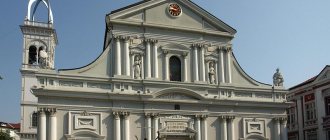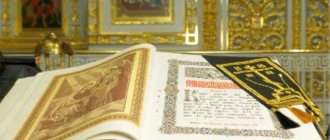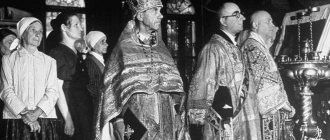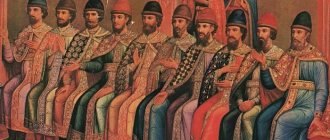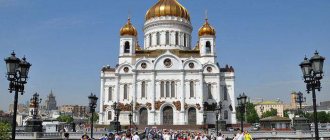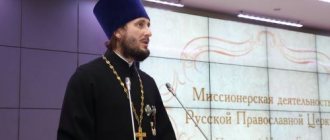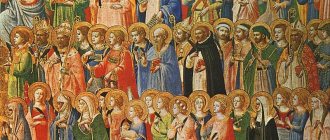Metropolitan - (Greek μητροπολίτης (from Greek μητρόπολις - capital city, mother of cities) - bishop of a regional city) - government degree of bishop; 2) bishop - holder of this government degree.
Metropolitan is the title of the bishop of the main city, region or province. The title of metropolitan arose because some bishops (of the main cities, that is, metropolises) had under their command several bishops subordinate to them who governed the dioceses. The metropolitan see was located in the main city (metropolis) of the province of the Roman Empire. Subsequently, bishops ruling large dioceses began to be called metropolitans. Currently, in the Russian Orthodox Church, the title “metropolitan” is an honorary title, following the title “archbishop”. A distinctive part of the Metropolitan's vestments is the white hood.
***
The New Testament bishop is the predecessor of the modern metropolitan
It is difficult to imagine how important bishops were in the early Christian church. We can't even say for sure whether it's a title or a function.
But nevertheless, such people are mentioned in the New Testament and clearly play a significant role in the community.
In subsequent centuries, communities expanded, and the functions of the bishop were defined much more clearly. He becomes the head of administrative-territorial units - settlements of the ancient world.
The Jewish high priest is one of the prototypes of the modern metropolitan
Bishops appear in every village, which the church leadership perceives negatively. It becomes clear that in order to preserve the integrity of the Church, a rigid vertical of power is necessary.
Orthodox Encyclopedia
Metropolitan
in its original meaning is the head of the metropolis, a vast ecclesiastical region that included several dioceses. The bishops leading the dioceses were subordinate to the metropolitan. But due to the fact that the church division of the country territorially coincided with the state borders of the regions, the metropolitan sees were located in the capitals of the republics. Later, the title of metropolitan began to be awarded to bishops who led particularly large dioceses. Nowadays, the Orthodox Church awards the title of metropolitan to particularly distinguished bishops as a reward for exemplary work. The title “Metropolitan” has become an honorary title, which is higher on the hierarchical ladder than the title “Archbishop”. The main difference between the Metropolitan’s vestments and other representatives of the clergy is the white hood.
The first metropolitan in Rus'
From the 10th century until 1589, there was no patriarch in Rus', and his duties were performed by the metropolitan. Therefore, he, as now the patriarch, was then only one - Kiev and All Rus'. The first bishops with such a title in Rus' were elected and appointed in Constantinople and, naturally, depended on the Patriarch of Constantinople and the emperor. Unlike bishops, they had some independence, because they were the head of the Russian church. But still, they most of all depended on the Kyiv prince.
Priests with this title helped to establish diplomatic relations between the principalities. They also managed to get things related to literature and education off the ground. Until the 13th century, their residence was Kyiv, then Vladimir, and starting from the 14th century - Moscow.
The very first Russian archpastor with this title was Michael I the Syrian, who baptized Prince Vladimir. However, the church was not yet divided into dioceses. Therefore, Michael did not fully possess the power of primate. His successor Leontius succeeded in dividing the church into dioceses. Starting with Hilarion, all primates began to be chosen from Russian people.
Drawing. 2. Saint Alexy of Moscow
Among the metropolitans of the Russian Orthodox Church, several are canonized. Among them, the most famous are the Moscow saints: Alexy, Philip, Macarius, Innocent, Peter, Jonah, Philaret.
Another eastern [edit]
In the Syrian Church of Mar Thoma [21], which is based in India, the metropolitan, also known as Mar Thoma, is the primate and supreme head of the church, who is entitled to special privileges and remains the highest authority over the synod. Philip Mar Chrysostom has been the senior metropolitan since 28 August 2007, and Joseph Mar Thoma was installed on 2 October 2007 as the 21st metropolitan of Malankara.
Name used by the Indian Eastern Protestant Syrian Christian-like evangelical denomination of believers of the Eastern Church as the current main leader of the church
Metropolitan in the Catholic Church
There are several differences between the bishops of the Orthodox Church and the Catholic ones. A Catholic archpastor with such a title has significantly less powers. He is both a metropolitan and an archbishop, heading both the metropolitanate and the archdiocese. Three Catholic bishops with this title are patriarchs: Venice, Lisbon and Jerusalem. They always lead divine services and ordain new bishops. They also accept appeals from the diocesan courts.
Links
Presbytery Priest • Hieromonk • Archpriest • Hegumen • Protopresbyter • Archimandrite Diaconate Deaconess • Subdeacon • Deacon • Hierodeacon • Protodeacon • Archdeacon Low clergy Beller • Exorcism • Kirofor • Reader Elders Monsignor (Prothonotary · Prelate Emeritus · Chaplain to His Holiness) · Vicar General · Episcopal Vicar · Canon · Probst · Archpriest · Dean (or District Vicar) · Pastor · Parish Administrator · Parish Vicar · Curate · Assistant Pastor · Chaplain Deacons Deacon · Permanent deacon Servants during the Liturgy Acolyte · Reader · Ceremoniary · Minister (Turiferarium · Cruciferarium) For certain tasks Prefect · Papal Legate · Apostolic Nuncio · Military Ordinary · Apostolic Administrator · Diocesan Administrator · Apostolic Vicar · Apostolic Prefect · Penitentiary · Archdeacon · Primicerium · Rector In Eastern Catholic churches Exarch · Archimandrite In Catholic orders Superior General · Provincial · Primate Abbot · Abbot (Mitred Abbot · Abbot Regular) · Novitius Abolished Royal Cardinal · Lay Cardinal · Prince-Bishop · District Bishop · Antibishop · Prelate Fiocchetto · Abbot Commendatorium · Subdeacon · Exorcist · Ostiary
Degrees of orders in Orthodoxy
It should be noted that in Orthodoxy there are three types of priesthood:
- Deacon is the level of ministry of the youngest group. They participate in all liturgies, but do not perform any Sacraments on their own.
- Priest is a degree of service conventionally called the middle group. The clergy of this group are empowered to perform six of the seven Sacraments. The exception is the sacrament of Ordination. In addition, they conduct all liturgies and services in churches. They are completely subordinate to the Bishops.
- The bishop is the highest rank of this group. He is vested with the power to govern the parishes of the region.
- Metropolitan is the highest rank of ministry. He has all the same rights of authority as a priest and a bishop. The only exception is that, according to his rank, he has the right to rule not only a village or city, but also an entire region.
The best article for you, go to: The Baptism of Jesus Christ on the Jordan River
Moreover, the entire clergy is divided into “black” and “white”. The first category includes monks, and the second category includes married people.
Many Orthodox believers are interested in the question of who is more important: the metropolitan or the patriarch? It should be noted that both ranks are quite high, but at the same time the patriarch is still more important. He represents the “chief” as a representative of the Church of the Landlords. The patriarch is chosen and agreed upon only at the Council. This is the highest rank of the entire church hierarchy.
Rules and recommendations for contacting clergy
As in secular life, there are also certain rules of etiquette in the church world. Surely every novice parishioner, when visiting a church, paid attention to the communication between the clergy. It is important to note the fact that there are certain rules not only for addressing the metropolitan in the Russian Orthodox Church, but also for other church ministers, which depends on the rank:
- It is customary to address a bishop, metropolitan and archbishop as “Your Holiness” or “Our Holy Master”;
- It is customary for clergy of the middle group in Orthodoxy to be addressed with the following phrase: “Your Reverence, Father...”; among the people, since ancient times, it has developed so that parishioners address the clergyman as “father”, according to the rules of church etiquette, this is permissible and is not considered a mistake or sin;
- It is customary to address deacons: “father...”.
Monks are addressed more simply - they are called “brothers” and “sisters”.
If a believer has met a bishop or priest, after they greet him, you can ask for blessings on certain matters. It is very important that your arms are folded in the form of a cross on your chest.
As we see, there is nothing complicated or confusing in orders and greetings. The main thing is that faith in the soul does not fade and there is repentance.
The list of metropolitans of the Russian Orthodox Church is constantly growing. We present to your attention the living ones:
- Agafangel (Savvin), Metropolitan of Odessa and Izmail;
- Alexander (Kudryashov), Metropolitan of Riga and All Latvia;
- Alexander (Mogilev), Metropolitan of Astana and Kazakhstan;
- Alexy (Kutepov), Metropolitan of Tula and Belevsky;
- Anastasy (Metkin), Metropolitan of Kazan and Tatarstan;
- Anthony (Fialko), Metropolitan of Khmelnitsky and Starokonstantinovsky;
- Aristarkh (Smirnov), Metropolitan of Kemerovo and Prokopyevsk;
- Vadim (Lazebny), Metropolitan of Irkutsk and Angarsk;
- Valentin (Mishchuk), Metropolitan of Orenburg and Saraktash;
- Barnabas (Kedrov), Metropolitan of Cheboksary and Chuvashia;
- Barsanuphius (Sudakov), Metropolitan of Saransk and Mordovia;
- Veniamin (Zaritsky), Metropolitan of Penza and Nizhnelomovsky;
- Veniamin (Pushkar), Metropolitan of Vladivostok and Primorsky;
- Vincent (Morar), Metropolitan of Tashkent and Uzbekistan, Central Asia;
- Victor (Oleynik), Metropolitan of Tver and Kashinsky;
- Vissarion (Stretovich), Metropolitan) of Ovruch and Korosten;
- Vladimir (Ikim), Metropolitan of Omsk and Tara;
- Vladimir (Kantaryan), Metropolitan) of Chisinau and all Moldavia;
- Vladimir (Kotlyarov), Metropolitan) of St. Petersburg and Ladoga;
- Vladimir (Moroz), Metropolitan of Pochaev, vicar of the Kyiv diocese;
- Vladimir (Sabodan), Metropolitan of Kiev and All Ukraine;
- Georgy (Danilov), Metropolitan of Nizhny Novgorod and Arzamas;
- Herman (Moralin), Metropolitan of Kursk and Rylsk;
- German (Timofeev), Metropolitan of Volgograd and Kamyshin;
- Daniil (Dorovskikh), Metropolitan of Arkhangelsk and Kholmogory;
- Daniel (Nushiro), Metropolitan of Tokyo and All Japan;
- Eusebius (Savvin), Metropolitan of Pskov and Velikoluksky;
- Ignatius (Pologrudov), Metropolitan of Khabarovsk and Amur Region;
- Hilarion (Alfeev), Metropolitan of Volokolamsk, vicar of the Moscow diocese;
- Hilarion (Capral), Metropolitan of Eastern America and New York, First Hierarch of the ROCOR;
- Hilarion (Shukalo), Metropolitan of Donetsk and Mariupol;
- John (Popov), Metropolitan of Belgorod and Stary Oskol;
- Ioannikiy (Kobzev), Metropolitan of B. Lugansk and Alchevsk;
- Job (Tyvonyuk), Metropolitan, former Chelyabinsk and Zlatoust;
- Joseph (Makedonov), Metropolitan of Ivanovo-Voznesensky and Vichuga;
- Irenei (Middle), Metropolitan of Dnepropetrovsk and Pavlograd;
- Isidore (Kirichenko), Metropolitan of Ekaterinodar and Kuban;
- Kirill (Nakonechny), Metropolitan of Yekaterinburg and Verkhoturye;
- Kirill (Pokrovsky), Metropolitan of Stavropol and Nevinnomyssk;
- Clement (Kapalin), Metropolitan of Kaluga and Borovsk;
- Cornelius (Jacobs), Metropolitan of Tallinn and All Estonia;
- Lazar (Shvets), Metropolitan of Simferopol and Crimea;
- Lev (Tserpitsky), Metropolitan of Novgorod and Staraya Rus';
- Longin (Korchagin), Metropolitan of Saratov and Volsky;
- Mark (Tuzhikov), Metropolitan of Vyatka and Slobodskaya;
- Mercury (Ivanov), Metropolitan of Rostov and Novocherkassk;
- Methodius (Nemtsov), Metropolitan of Perm and Solikamsk;
- Nikolai (Shkrumko), Metropolitan of Izhevsk and Udmurtia;
- Nikon (Vasyukov), Metropolitan of Ufa and Sterlitamak;
- Niphon (Maloduha), Metropolitan of Volyn and Lutsk;
- Onufry (Berezovsky), Metropolitan of Chernivtsi and Bukovina;
- Pavel (Lebed), Metropolitan of Vyshgorod and Chernobyl, vicar of the Kyiv diocese;
- Pavel (Ponomarev), Metropolitan of Ryazan and Mikhailovsky;
- Panteleimon (Dolganov), Metropolitan of Yaroslavl and Rostov;
- Panteleimon (Kutovoy), Metropolitan of Krasnoyarsk and Achinsk;
- Pitirim (Starinsky), Metropolitan of Nikolaev and Ascension;
- Plato (Udovenko), Metropolitan of Argentina and South America;
- Proclus (Khazov), Metropolitan of Simbirsk and Novospassky;
- Sergius (Gensitsky), Metropolitan of Ternopil and Kremenets;
- Sergius (Poletkin), Metropolitan of Samara and Syzran;
- Sergius (Fomin), Metropolitan of Voronezh and Borisoglebsk;
- Simeon (Shostatsky), Metropolitan of Vinnitsa and Mogilev-Podolsk;
- Sophrony (Dmitruk), Metropolitan of Cherkassy and Kaniv;
- Tikhon (Emelyanov), Metropolitan of Novosibirsk and Berdsk;
- Theodosius (Protsyuk), metropolitan, b. Omsk and Tarsky;
- Feofan (Ashurkov), Metropolitan of Chelyabinsk and Zlatoust;
- Filaret (Vakhromeev), Metropolitan of Minsk and Slutsk, Patriarchal Exarch of All Belarus;
- Philip (Osadchenko), Metropolitan of Poltava and Mirgorod;
- Chrysostom (Martishkin), metropolitan, b. Vilensky and Litovsky;
- Yuvenaly (Poyarkov), Metropolitan of Krutitsky and Kolomna;
- Yuvenaly (Tarasov), metropolitan, b. Kursky and Rylsky.
May the Lord protect you!
The best article for you, go to: The ordeals of the soul after death - how the soul goes through the ordeals

